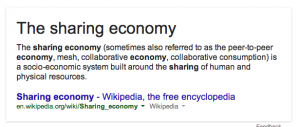I was riding with Quincy yesterday, a driver for the ride-sharing service Uber, and we got to talking about his day.
What he said absolutely floored me:
Quincy drives Uber 7 days per week for a total of 16 hours per day
Of course, this led to quite a few questions from me:
- You really work every day of the week?
- How does your body physically handle 16 hour work days?
- Do you have a significant other? Because I’m sure that he/she does not love your schedule 🙂
Quincy’s story surprised me so much that I actually sent a tweet from the cab:
Just met an @uber driver who works 16 hour days, 7 days per week and grosses $107k+ per year #wow blog post coming
— Mike Krass (@mikekrass) August 14, 2014
A tweet that was favorited by sharing economy proponent Jeremiah Owyang:
Hey @jowyang you hear about Uber driver who grosses $107k+ annually? Sharing economy at its best … Link: https://t.co/xQbTzLEhwb
— Mike Krass (@mikekrass) August 14, 2014
We’ll get to the sharing economy conversation later in this blog post. First, let me tell you what Quincy shared about his experience driving for Uber.
Here is what Quincy told me about his decision to drive Uber:
“I used to work three part-time jobs and still made half as much as I do driving Uber now”
That line totally blew me away. Quincy was working at San Francisco International Airport, for Google and had a third part-time job to help pay the bills. So what happened when he started driving Uber?
“Uber let’s me set my own hours. I work when I want, for however long I want and take breaks whenever I choose. Not only that, but I’m set to make 6-figures this year!”
Quincy also mentioned that the money he’s earning from Uber is “absolutely addictive”
“I’m getting paid for all the hard work I put in every day, and it’s all completely on my own terms. Uber gives me more freedom than any other job I’ve ever had and pays me way more than I could ever earn working two or three jobs like I used to. How can you not be in love with that?”
Which made me think: How is the sharing economy changing the working class?
The Sharing Economy in one infography : http://t.co/316A3GJEyT pic.twitter.com/N2mnszQlY5
— FABERNOVEL (@FABERNOVEL) July 21, 2014
Before companies like Uber and Air BnB existed, assets like your apartment or care used to be a *debit* on your expense report every month when you weren’t using them.
Enter: the Sharing Economy.
A term coined for companies like Uber, Lyft and Air BnB, the sharing economy is the ability to share your possessions, or assets, and turn these assets into revenue generators instead of letting them sit idly by when you aren’t using them.
Which leads me to ask the question:
Is Quincy’s story an early peak at how the “average joe’s” and working class people of this country will begin to change the way they pay the bills?
If the answer is yes, then what will happen as middle-class jobs continue to disappear and that crowd moves up in the world to earning 6-figure salaries driving for companies like Uber or Lyft?




